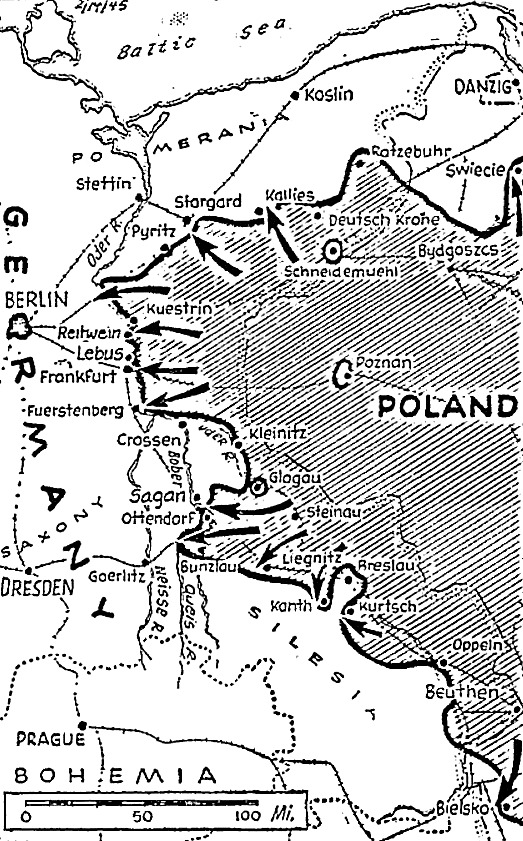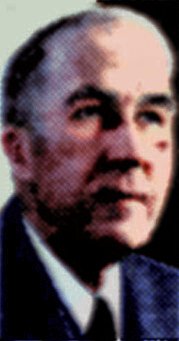U.S. State Department (February 14, 1945)
711.90F/2-1445
Memorandum of Conversation Between the King of Saudi Arabia and President Roosevelt, Aboard the USS Quincy
February 14, 1945
I. The President asked His Majesty for his advice regarding the problem of Jewish refugees driven from their homes in Europe. His Majesty replied that in his opinion the Jews should return to live in the lands from which they were driven. The Jews whose homes were completely destroyed and who have no chance of livelihood in their homelands should be given living space in the Axis countries which oppressed them. The President remarked that Poland might be considered a case in point. The Germans appear to have killed three million Polish Jews, by which count there should be space in Poland for the resettlement of many homeless Jews.
His Majesty then expounded the case of the Arabs and their legitimate rights in their lands and stated that the Arabs and the Jews could never cooperate, neither in Palestine, nor in any other country. His Majesty called attention to the increasing threat to the existence of the Arabs and the crisis which has resulted from continued Jewish immigration and the purchase of land by the Jews. His Majesty further stated that the Arabs would choose to die rather than yield their lands to the Jews.
His Majesty stated that the hope of the Arabs is based upon the word of honor of the Allies and upon the well-known love of justice of the United States, and upon the expectation that the United States will support them.
The President replied that he wished to assure His Majesty that he would do nothing to assist the Jews against the Arabs and would make no move hostile to the Arab people. He reminded His Majesty that it is impossible to prevent speeches and resolutions in Congress or in the press which may be made on any subject. His reassurance concerned his own future policy as Chief Executive of the United States Government.
His Majesty thanked the President for his statement and mentioned the proposal to send an Arab mission to America and England to expound the case of the Arabs and Palestine. The President stated that he thought this was a very good idea because he thought many people in America and England are misinformed. His Majesty said that such a mission to inform the people was useful, but more important to him was what the President had just told him concerning his own policy toward the Arab people.
II. His Majesty stated that the problem of Syria and the Lebanon was of deep concern to him and he asked the President what would be the attitude of the United States Government in the event that France should continue to press intolerable demands upon Syria and the Lebanon. The President replied that the French Government had given him in writing their guarantee of the independence of Syria and the Lebanon and that he could at any time write to the French Government to insist that they honor their word. In the event that the French should thwart the independence of Syria and the Lebanon, the United States Government would give to Syria and the Lebanon all possible support short of the use of force.
III. The President spoke of his great interest in farming, stating that he himself was a farmer. He emphasized the need for developing water resources, to increase the land under cultivation as well as to turn the wheels which do the country’s work. He expressed special interest in irrigation, tree planting and water power which he hoped would be developed after the war in many countries, including the Arab lands. Stating that he liked Arabs, he reminded His Majesty that to increase land under cultivation would decrease the desert and provide living for a larger population of Arabs. His Majesty thanked the President for promoting agriculture so vigorously, but said that he himself could not engage with any enthusiasm in the development of his country’s agriculture and public works if this prosperity would be inherited by the Jews.
890F.515/1-2445
The Acting Secretary of State to the Foreign Economic Administrator
Washington, February 14, 1945
My Dear Mr. Crowley: I refer to your letter of January 24, 1945, addressed to the Secretary, reviewing certain aspects of lend-lease assistance to Saudi Arabia in the past, and recalling discussions between officers of the Department and the Foreign Economic Administration with regard to the desirability of placing the Saudi Arabian supply program on a more permanent basis and of substituting some other form of assistance for lend-lease aid. Your letter suggests that any new means of financing a supply program for Saudi Arabia should take effect at the beginning of the 1946 fiscal year, that is, on July 1, 1945.
While the Department is aware of the reluctance of the Foreign Economic Administration to continue lend-lease aid to Saudi Arabia after June 30, 1945, and will continue to press its search for a feasible alternative procedure, no definite plans have yet matured. In the Department’s judgment it would be unwise to assume that such plans can be developed and put into effect before July 1, 1946.
To provide sufficient time for consideration of all the factors involved, because of the political importance of assuring an uninterrupted flow of essential supplies to Saudi Arabia, and in furtherance of the war effort, it is requested that the Foreign Economic Administration take the measures necessary to make lend-lease help available to Saudi Arabia until July 1, 1946 on approximately the same basis as during the calendar year 1944.
The Department and the Foreign Economic Administration have already proposed to the British Embassy the continuation of the joint supply program for Saudi Arabia during the first semester of 1945 at the same level as in 1944. Conceivably it might be necessary to continue at this level throughout 1945 and the first six months of 1946. Aid to be extended to Saudi Arabia during the first half of 1945 would be financed from the current Foreign Economic Administration budget, while that extended during the latter half of 1945 and the first six months of 1946 would be charged to the 1946 appropriations of the Foreign Economic Administration. It is therefore suggested that the necessary provisions be made in your 1946 budget estimates to allow for help to Saudi Arabia as indicated above. The Department of State will be glad, if requested to do so, to support the inclusion of lend-lease funds for Saudi Arabia in your 1946 estimates.
The foregoing is based on the assumption that during the entire period to July 1, 1946, a joint American-British supply program for Saudi Arabia similar to that in effect in 1944 will be in operation. Should the British contribution to the joint program be decreased or withdrawn, help for Saudi Arabia might be needed on a scale larger than that indicated above.
Sincerely yours,
JOSEPH C. GREW

